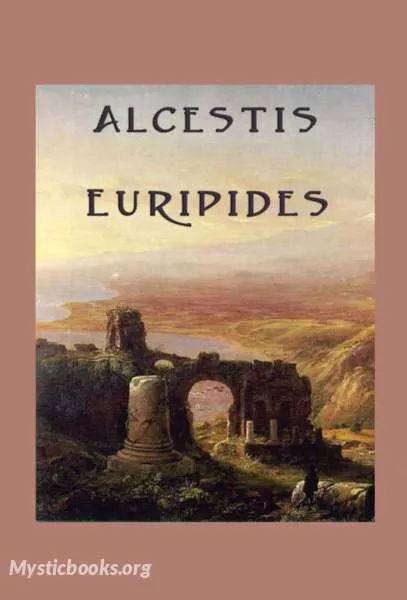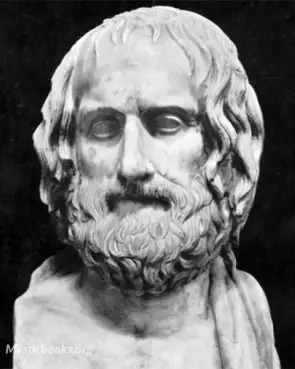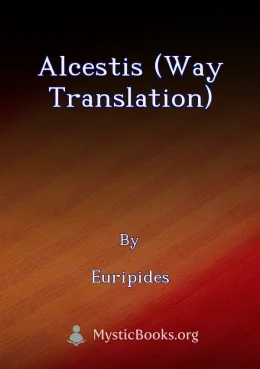
Alcestis
by Euripides
'Alcestis' Summary
Alcestis was the fairest among the daughters of Pelias, king of Iolcus, and either Anaxibia or Phylomache. She was sister to Acastus, Pisidice, Pelopia and Hippothoe. Alcestis was the wife of Admetus by whom she bore a son, Eumelus, a participant in the siege of Troy, and a daughter, Perimele
Many suitors appeared before King Pelias and tried to woo Alcestis when she came of age to marry. It was declared by her father that she would marry the first man to yoke a lion and a boar (or a bear in some cases) to a chariot. The man who would do this, King Admetus, was helped by Apollo, who had been banished from Olympus for one year to serve as a shepherd to Admetus. With Apollo's help, Admetus completed the challenge set by King Pelias, and was allowed to marry Alcestis. But in a sacrifice after the wedding, Admetus forgot to make the required offering to Artemis, therefore when he opened the marriage chamber he found his bed full of coiled snakes. Admetus interpreted it a portent of an early death.
Apollo again helped the newlywed king, this time by making the Fates drunk, extracting from them a promise that if anyone would want to die instead of Admetus, they would allow it. And when the day of his death came near, no one volunteered, not even his elderly parents, but Alcestis stepped forth to die in his stead. Shortly after fighting with Thanatos, Heracles rescued Alcestis from the underworld as a token of appreciation for Admetus' hospitality. In some accounts Persephone, 'the Maiden', sent her up again. But when she comes back alive she is mute. She chooses not to speak.
Book Details
Language
EnglishOriginal Language
Ancient GreekPublished In
Authors

Euripides
Greece
Euripides was a tragedian of classical Athens. Along with Aeschylus and Sophocles, he is one of the three ancient Greek tragedians for whom any plays have survived in full. Some ancient scholars attri...
Books by EuripidesDownload eBooks
Listen/Download Audiobook
Related books

King Leir and His Three Daughters by Anonymous
King Leir is an anonymous play that tells the story of the legendary British king Leir and his three daughters. The play was written in the late 16th...

Cleone. A Tragedy by Robert Dodsley
Cleone is a tragedy in five acts by Robert Dodsley. It was first performed in 1758 and is based on the legend of Saint Genevieve. The play tells the s...

McTeague by Frank Norris
McTeague is a simple dentist who becomes infatuated with Trina, the cousin of his friend Marcus. Trina then buys a winning lottery ticket worth $5,000...

Verbrechen by Maxim Gorky
In 'Verbrechen,' Maxim Gorky portrays the harsh realities of poverty and social injustice in rural Russia during the 19th century. The story follows W...

Cyrano de Bergerac by Edmond Rostand
Cyrano de Bergerac is a classic French play written by Edmond Rostand in 1897. It is a romantic tragedy about a man with a large nose who falls in lov...

Trachiniai (Campbell Translation) by Sophocles
Sophocles' "Women of Trachis" is a powerful exploration of love, jealousy, and the destructive forces of fate. The play centers on Deianeira, the wife...

Monster and Other Stories by Stephen Crane
Stephen Crane's final collection of stories explores the fragility of human relationships and the devastating consequences of single moments. The titl...

Phantom-Wooer by Thomas Lovell Beddoes
LibriVox volunteers bring you 13 different recordings of The Phantom-Wooer by Thomas Lovell Beddoes. This was the weekly poetry project for the week o...

Camp of Wallenstein by Friedrich Schiller
Camp of Wallenstein is the first play in Friedrich Schiller's Wallenstein trilogy. It provides a glimpse into the world of Albrecht von Wallenstein, a...

Alcestis (Way Translation) by Euripides
Euripides' *Alcestis* is a powerful and moving tragedy exploring themes of love, sacrifice, and the nature of mortality. Alcestis, a virtuous queen,...
Reviews for Alcestis
No reviews posted or approved, yet...